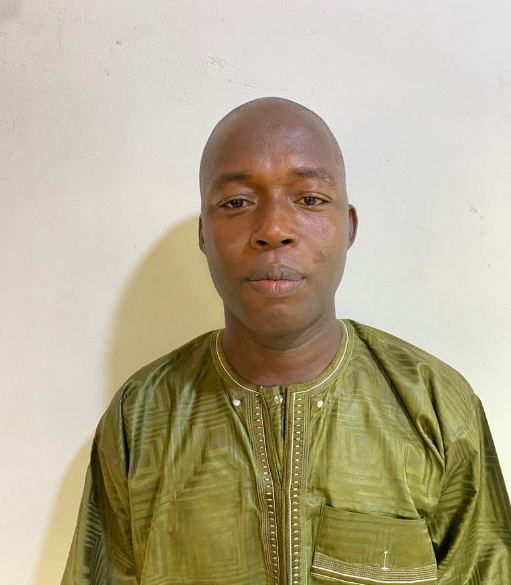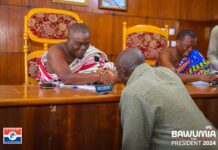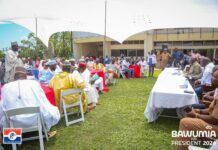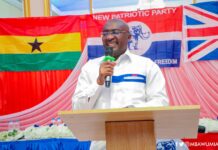
For some historical reasons, since 1992 when the nation was ushered into multi-party democracy, no Muslim politician has led any major political party with a realistic chance of becoming the President of Ghana. For the broader northern regions, it was only in 2012 when President John Mahama won his first term. If we are interested in going deeper into history, since 1979 when Alhaji Imoru Egala, former foreign minister under President Kwame Nkrumah founded the People’s National Party (PNP), no Muslim politician has got closer to becoming Ghana’s president. Therefore, for those who genuinely believe in the so-called ‘democratic inclusivity’ of globalization and global liberalism, Dr Mahamudu Bawumia may be on his way towards making a history in the December 7 presidential elections regardless of the outcome.
While the tide of the 1979 contest was strongly on the side of Alhaji Egala to win the presidential elections had he not been disqualified from contesting (given the eventual victory of his handpicked protégé, Dr Hilla Limann in the election), it is difficult to say the same for Dr Bawumia, at least in the 2024 (and possibly 2028) elections, given the biting economic hardship, the numerous unfulfilled political promises of turning Ghana into almost a ‘paradise’ on Earth by the Akufo-Addo and Bawumia campaign before the 2016 elections, the general lack of popular trust in the NPP government and the usual incumbency baggage burdening the Bawumia campaign of 2024 elections. I must however admit that, since 1992, the Akufo-Addo-Bawumia government is not the only incumbent that has faced these challenges and burden of incumbency liabilities after serving the mandatory two-terms in office. Although with varied intensity, the scenario playing out now was witnessed when candidate Prof Atta Mills tried to succeed President Jerry Rawlings in 2000 and when candidate Akufo-Addo sought to take over from President John Kufuor in 2008. We also cannot forget a similar trend in 2016 when President John Mahama made frantic effort to succeeded himself after taking over from President Mills and getting elected in 2012 for his first term. It is clear for any observer of the Ghanaian political processes and voting behaviours that, but for his sudden demise, the 2012 elections would have witnessed the re-election of President Mills for a second term. In that case, President Mahama would have had to wait to 2024 before getting the chance of ascending to the presidency for his first tenure. Thus, to the relief of the ordinary Ghanaian, the ‘two-election turnover’ principle is working in Ghana and losing presidential elections by the two main political parties seems to be a ritual poetic justice in every eight years to at least atone for the ungovernable greed, lies, deceit, economic mismanagement, corruption, broken political promises, divisiveness and dishonesty that have defined our politics since 1992 and even before. Therefore, despite the palpable failure of the democratic state to guarantee social justice and social entitlement of the ordinary people of Ghana in the past three decades, we can at least take solace in the retributive justice of the democratic processes against the continuous perpetration of misrule and social injustice by Ghanaian politicians across the aisle since 1992.
Going by this, Dr Bawumia faces an uphill task in winning the 2024 presidential elections at the expense of John Dramani Mahama, in spite of the fact that both presidential candidates do not seem to have any new or transformative ideas and political courage necessary in changing the structure and direction of the national economy from the cycle of debt, deficit and endless austerity which are inevitably the toxic economic recipe prepared for ordinary Ghanaians following decades of ‘religious’ implementation of International Monetary Fund and World Bank neoliberal policies. If any-thing, Bawumia would have to follow the political convention of the Fourth Republic and remain in the queue for either 2028 or 2032 elections. While 2032 may be the appropriate period for Bawumia to be in pole position to win a presidential election given the two-terms turnover convention since 1992, different scenarios and factors can intervene to either lessen the duration to 2028 or even frustrate the presidential ambition of the vice-president altogether. For instance, there is the tendency that should Mahama become victorious (which is likely), the NDC is going to undoubtedly suffer from internal bickering, acrimony and division on who would succeed him, given the scores of ambitious generations of politicians who have lined up around the NDC leader waiting for the opportunity to succeed him in 2028.
This would not only distract the attention of a potential Mahama government from providing effective governance, but also render the president a lame duck. This is particularly the case when NDC elects a new presidential candidate two or three years into Mahama’s administration and loyalty of the party and government is inevitably divided between the incumbent president and the party’s presidential candidate for the 2028 election. Moreover, in the economic arena, given the current fiscal deterioration, public debt burden and almost endless austerity, very little could be achieved by any party or presidential candidate that would win the next elections. In the case of President Mahama, the four years may not even be enough for him to mobilize sufficient resources and complete the numerous infrastructural projects he started before 2017 and which were deliberately abandoned by the Akufo-Addo administration in favour of initiating new ones. Consequently, as is often the case in Ghana’s deceitful and dishonest politics, hypothetically, it may be easier for the NPP after losing the 2024 elections to mount a sustained propaganda against the Mahama administration and shifts all the blames of the economic difficulties from itself to the NDC government starting from 2025. Should this scenario play out successfully for the NPP given the Ghanaian voters’ tendency to be swayed by the one with the loudest voice even if the noise is empty, Bawumia may be able to shorten his stay in opposition by four years and likely repeat what has just happened in Liberia recently with the defeat of President George Oppong Weah by former vice-president Joseph Nyumah Boakai after serving just one term.
On the flip side, the other hypothetical question that is crucial to this debate is: would the NPP party stand by Bawumia as they stood by President Kufuor in the presidential primaries leading to the 1996 and 2000 presidential elections and Akufo-Addo in the 2008, 2012 and 2016 elections, if he (Bawumia) loses the 2024 and possibly 2028 elections? If the answer is yes and the NPP decides to stand firmly behind Bawumia and retain him as the party’s leader for 2028 and 2032 elections, then there is the likelihood that he could be crowned as the president of Ghana at least in 2033. The reasons for that would be the same reasons which are presently propelling President Mahama back into electoral victory in 2024: failing economy, debt burden, fiscal austerity, corruption, greed, dishonesty, internal party division and strife and general loss of trust on incumbent governments. Thus, it would be yet again the retributive justice of the democratic process at play once more.
AUTHOR: Abdul Hakim Ahmed, PhD, Political Science
Lecturer, Political Science, University of Education, Winneba.
E-mail: ahahmed@uew.edu.gh
Source: Ghana/Starrfm.com.gh/103.5FM




